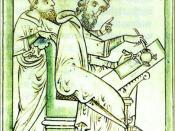One of the great known philosophers throughout time is Socrates. During the accent Greek times, Socrates had indulged upon seeking wisdom. The play "The Trail and Death of Socrates" by Plato, dramatically explains who a philosopher is, what Socrates wants and how he will achieve it. According to professor Embree, Plato was a brilliant philosopher who was an expert upon the examination of attitudes. Plato's great writing, "The trail and death of Socrates" have taught those whom choose to seek wisdom.
Socrates was a sophist for his time. The "The trail and death of Socrates" starts outside the king's court. Euthyphro, a professional priest, initiates a conversation with Socrates. Euthypro is going to the court to place charges upon his own father. Socrates in great shock, after hearing the plan of Euthyphro, attempts to enlighten him explaining righteous philosophy. In accent Greek society, what is pious and impious is love and hatred for the Gods.
Socrates asks Euthyphro, what pious and impious means. Socrates asks questions, cross examining Euthyphro. What Socrates ends up finding out is no definitive answer. Socrates asks if being pious is doing deeds to the Gods to be loved, or being loved by the Gods for not doing impious deeds. At Euthyphro believes what is dear to the Gods is pious and what is not dear to the Gods is impious. Socrates transforms Euthyphro's thoughts about what is pious and impious. Accent Greek mythology has faults among what is pious and impious. The myth of Zeus explains murder happening amongst the Gods, creating diversity of pious deeds to different Gods. This gives ambiguity of what's pious and impious when thoroughly thought out. When a subject matter is full of ambiguities, seeking the truth is an act one of the social elite would commence. Plato, a social elite for his time, inspires readers to do follow through his writings.
Utilizing the mind to think and challenge one's self can be done so by asking questions. When a challenge crosses, the best solution is to solve it strategically. A simple example would be how to cross the street without getting hit be a car. If there is a cross walk light, use it by waiting for the appropriate light to cross. Socrates makes Euthyphro think through asking questions. Primarily, Socrates wants Euthyphro to realize his wrong doings. By making Soctates think, one can learn how to seek wisdom by asking questions. Plato teaches readers to ask questions, in a respectful manor, to obtain intelligence.
When Euthyphro answers Socrates questions, it is cross examination. As Euthphro answers, the truth gets closer. Socrates responds to Euthyphro with another question, making Euthyphro think further. At points Socrates responds with explanations that allow Euthyphro to rethink what is right and what is wrong, not upon the initial leanings. Socrates never discriminates of what Euthyphro says, rather Socrates repeats what Euthyphro says, analyzes it and creates scene of it. Plato trains readers to use cross examination to analyze one's attitudes.
Socrates makes scene of what he is teaching by using relative examples. On page 14 and 15 of "The Trial and Death of Socrates", Socrates instructs Euthyphro upon the wider view of things. Socrates demonstrates that piety is a portion of justice. Socrates compares fear being the bigger emotion that covers shame. When the bigger concept is applied, attitudes are potential to be persuasive. Plato retells how to properly persuade someone into realizing where one's attitude is based upon.
Socrates and Euthyphro conversation ends up going in circles without a definitive answer. In the end, there is a mystery of what Euthyphro is thinking. One may say he left the conversation without a change in Euthyphro attitude. The other way upon viewing Euthyphro's thoughts, he was left wondering what pious, impious is and what makes scene of justice. Either way, Plato's understanding of philosophy has been well written to educate an individual who seeks wisdom.


